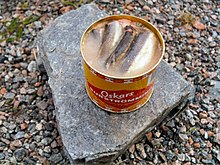
A holiday is a day or other period of time set aside for festivals or recreation. Public holidays are set by public authorities and vary by state or region. Religious holidays are set by religious organisations for their members and are often also observed as public holidays in religious majority countries. Some religious holidays, such as Christmas, have become secularised by part or all of those who observe them. In addition to secularisation, many holidays have become commercialised due to the growth of industry.

May Day is a European festival of ancient origins marking the beginning of summer, usually celebrated on 1 May, around halfway between the Northern Hemisphere's Spring equinox and June solstice. Festivities may also be held the night before, known as May Eve. Traditions often include gathering wildflowers and green branches, weaving floral garlands, crowning a May Queen, and setting up a Maypole, May Tree or May Bush, around which people dance and sing. Bonfires are also a major part of the festival in some regions. Regional varieties and related traditions include Walpurgis Night in central and northern Europe, the Gaelic festival Beltane, the Welsh festival Calan Mai, and May devotions to the Blessed Virgin Mary. It has also been associated with the ancient Roman festival Floralia.
The liturgical year, also called the church year, Christian year, ecclesiastical calendar, or kalendar, consists of the cycle of liturgical days and seasons that determines when feast days, including celebrations of saints, are to be observed, and which portions of scripture are to be read.
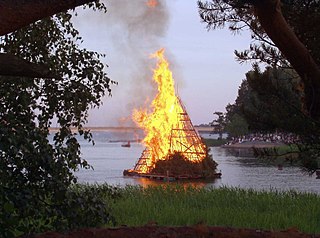
A bonfire is a large and controlled outdoor fire, used either for informal disposal of burnable waste material or as part of a celebration.

Christmas Eve is the evening or entire day before Christmas, the festival commemorating the birth of Jesus. Christmas Day is observed around the world, and Christmas Eve is widely observed as a full or partial holiday in anticipation of Christmas Day. Together, both days are considered one of the most culturally significant celebrations in Christendom and Western society.

Walpurgis Night, an abbreviation of Saint Walpurgis Night, also known as Saint Walpurga's Eve and Walpurgisnacht, is the eve of the Christian feast day of Saint Walpurga, an 8th-century abbess in Francia, and is celebrated on the night of 30 April and the day of 1 May. This feast commemorates the canonization of Saint Walpurga and the movement of her relics to Eichstätt, both of which occurred on 1 May 870.
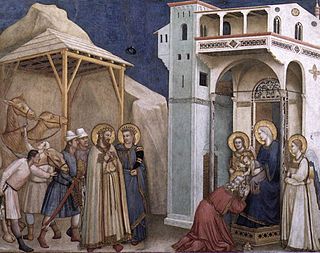
The Twelve Days of Christmas, also known as the Twelve Days of Christmastide, are the festive Christian season celebrating the Nativity.

Saint John's Eve, starting at sunset on 23 June, is the eve of the feast day of Saint John the Baptist. This is one of the very few feast days marking a saint's birth, rather than their death. The Gospel of Luke states that John was born six months before Jesus; therefore, the feast of John the Baptist was fixed on 24 June, six months before Christmas. In the Roman calendar, 24 June was the date of the summer solstice, and Saint John's Eve is closely associated with Midsummer festivities in Europe. Traditions are similar to those of May Day and include bonfires, feasting, processions, church services, and gathering wild plants.

Christmastide, also known as Christide, is a season of the liturgical year in most Christian churches.
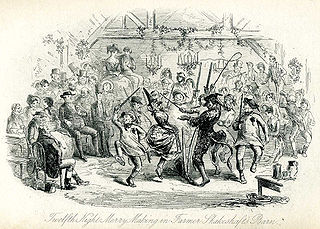
Twelfth Night is a Christian festival on the last night of the Twelve Days of Christmas, marking the coming of the Epiphany. Different traditions mark the date of Twelfth Night as either 5 January or 6 January, depending on whether the counting begins on Christmas Day or 26 December. January 6 is celebrated as the feast of Epiphany, which begins the Epiphanytide season.

Saint Nicholas Day, also called the "Feast of Saint Nicholas", observed on 6 December in Western Christian countries, and on 19 December in Eastern Christian countries using the old church Calendar, is the feast day of Saint Nicholas of Myra; it falls within the season of Advent. It is celebrated as a Christian festival with particular regard to Saint Nicholas' reputation as a bringer of gifts, as well as through the attendance of church services.

The observance of Christmas around the world varies by country. The day of Christmas, and in some cases the day before and the day after, are recognized by many national governments and cultures worldwide, including in areas where Christianity is a minority religion. In some non-Christian areas, periods of former colonial rule introduced the celebration ; in others, Christian minorities or foreign cultural influences have led populations to observe the holiday.

Jul or jol is the term used for the Christmas holiday season in Scandinavia and parts of Scotland. Originally, jul was the name of a month in the old Germanic calendar. The concept of jul as a period of time rather than a specific event prevailed in Scandinavia; in modern times, jul is a period of time stretching from the fourth Sunday before Christmas Eve, December 24, to (traditionally) mid-January at the date of Epiphany with the month of December and Christmas, and the week up to the New Year, as its highlight. The modern English yule and yuletide are cognates with this term.
The Old New Year, the Orthodox New Year, also known as Ra's as-Sanah or Ras el-Seni in the Middle East, is an informal traditional holiday, celebrated as the start of the New Year by the Julian calendar. In the 20th and 21st centuries, the Old New Year falls on January 14 in the Gregorian calendar.
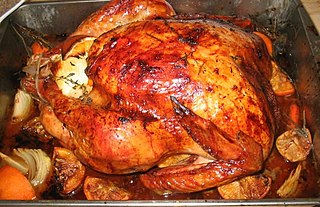
Christmas dinner is a meal traditionally eaten at Christmas. This meal can take place any time from the evening of Christmas Eve to the evening of Christmas Day itself. The meals are often particularly rich and substantial, in the tradition of the Christian feast day celebration, and form a significant part of gatherings held to celebrate the arrival of Christmastide. In many cases, there is a ritual element to the meal related to the religious celebration, such as the saying of grace.
In Sweden, public holidays are established by acts of Parliament. The official holidays can be divided into Christian and non-Christian holidays. The Christian holidays are jul (Christmas), trettondedag jul (Epiphany), påsk (Easter), Kristi himmelsfärds dag, pingstdagen (Pentecost), and alla helgons dag. The non-Christian holidays are: nyårsdagen, första maj, Sveriges nationaldag, and midsommar (Midsummer). Midsummer is, however, officially also a Christian holiday to celebrate John the Baptist's birthday.

Waffle Day is a tradition that is celebrated in Sweden, Norway and Denmark on 25 March, which is also the Feast of the Annunciation, upon which waffles are typically eaten. The shift from the religious celebration to Waffle Day occurred because the Swedish Vårfrudagen, meaning "Our Lady's Day" or "the Day of our Lady", sounds similar to våffeldagen in faster speech, and so over time Swedes began calling it Waffle Day and celebrating by eating waffles.

Christmas is celebrated throughout December and traditionally until St. Knut's Day on January 13. The main celebration and the exchange of gifts in many families takes place on Christmas Eve, December 24. The Feast of St. Lucy, a high point in the Swedish Christmas season, is celebrated during Advent, on December 13.
England traditionally celebrates a number of Christian and secular festivals. Most are observed throughout the country but some, such as Oak Apple Day, Souling, Rushbearing, Bawming the Thorn, and Hocktide, are local to certain regions.






